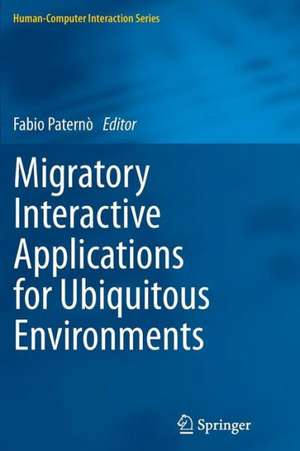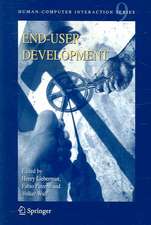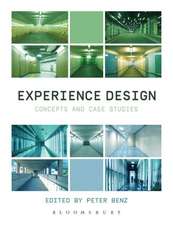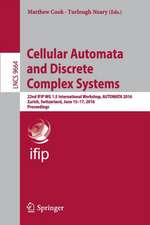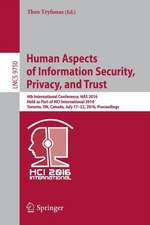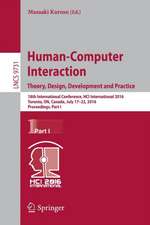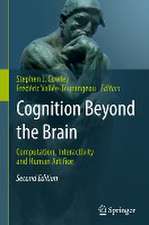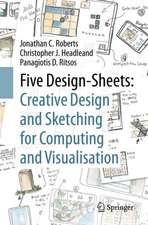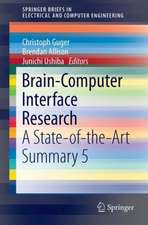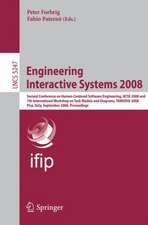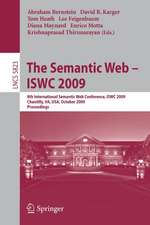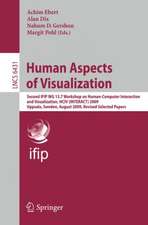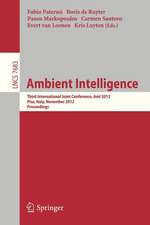Migratory Interactive Applications for Ubiquitous Environments: Human–Computer Interaction Series
Editat de Fabio Paternòen Limba Engleză Paperback – 21 apr 2013
| Toate formatele și edițiile | Preț | Express |
|---|---|---|
| Paperback (1) | 748.89 lei 6-8 săpt. | |
| SPRINGER LONDON – 21 apr 2013 | 748.89 lei 6-8 săpt. | |
| Hardback (1) | 646.80 lei 6-8 săpt. | |
| SPRINGER LONDON – 11 mar 2011 | 646.80 lei 6-8 săpt. |
Din seria Human–Computer Interaction Series
- 20%
 Preț: 655.85 lei
Preț: 655.85 lei - 20%
 Preț: 309.25 lei
Preț: 309.25 lei - 20%
 Preț: 375.54 lei
Preț: 375.54 lei - 20%
 Preț: 644.48 lei
Preț: 644.48 lei - 20%
 Preț: 667.75 lei
Preț: 667.75 lei - 20%
 Preț: 664.44 lei
Preț: 664.44 lei - 20%
 Preț: 1164.84 lei
Preț: 1164.84 lei - 20%
 Preț: 817.55 lei
Preț: 817.55 lei - 20%
 Preț: 657.16 lei
Preț: 657.16 lei - 20%
 Preț: 645.31 lei
Preț: 645.31 lei - 20%
 Preț: 938.66 lei
Preț: 938.66 lei - 15%
 Preț: 658.05 lei
Preț: 658.05 lei - 20%
 Preț: 822.51 lei
Preț: 822.51 lei - 20%
 Preț: 654.21 lei
Preț: 654.21 lei - 20%
 Preț: 994.26 lei
Preț: 994.26 lei - 20%
 Preț: 1621.89 lei
Preț: 1621.89 lei - 20%
 Preț: 991.60 lei
Preț: 991.60 lei - 20%
 Preț: 783.45 lei
Preț: 783.45 lei - 20%
 Preț: 1175.42 lei
Preț: 1175.42 lei - 20%
 Preț: 659.97 lei
Preț: 659.97 lei - 20%
 Preț: 219.15 lei
Preț: 219.15 lei - 20%
 Preț: 334.86 lei
Preț: 334.86 lei - 20%
 Preț: 969.84 lei
Preț: 969.84 lei - 20%
 Preț: 642.19 lei
Preț: 642.19 lei - 20%
 Preț: 314.39 lei
Preț: 314.39 lei - 20%
 Preț: 661.14 lei
Preț: 661.14 lei - 20%
 Preț: 995.89 lei
Preț: 995.89 lei - 20%
 Preț: 752.58 lei
Preț: 752.58 lei - 20%
 Preț: 990.30 lei
Preț: 990.30 lei - 20%
 Preț: 990.12 lei
Preț: 990.12 lei - 20%
 Preț: 336.21 lei
Preț: 336.21 lei - 20%
 Preț: 334.71 lei
Preț: 334.71 lei - 20%
 Preț: 312.62 lei
Preț: 312.62 lei - 20%
 Preț: 994.92 lei
Preț: 994.92 lei - 20%
 Preț: 331.74 lei
Preț: 331.74 lei - 20%
 Preț: 646.80 lei
Preț: 646.80 lei - 20%
 Preț: 334.86 lei
Preț: 334.86 lei - 20%
 Preț: 994.40 lei
Preț: 994.40 lei - 20%
 Preț: 329.76 lei
Preț: 329.76 lei - 20%
 Preț: 332.24 lei
Preț: 332.24 lei - 20%
 Preț: 992.11 lei
Preț: 992.11 lei - 20%
 Preț: 650.40 lei
Preț: 650.40 lei - 20%
 Preț: 337.00 lei
Preț: 337.00 lei - 20%
 Preț: 332.39 lei
Preț: 332.39 lei - 20%
 Preț: 1279.86 lei
Preț: 1279.86 lei - 15%
 Preț: 636.12 lei
Preț: 636.12 lei - 20%
 Preț: 336.67 lei
Preț: 336.67 lei - 20%
 Preț: 1000.70 lei
Preț: 1000.70 lei - 20%
 Preț: 645.14 lei
Preț: 645.14 lei
Preț: 748.89 lei
Preț vechi: 936.12 lei
-20% Nou
Puncte Express: 1123
Preț estimativ în valută:
143.30€ • 150.02$ • 118.57£
143.30€ • 150.02$ • 118.57£
Carte tipărită la comandă
Livrare economică 05-19 aprilie
Preluare comenzi: 021 569.72.76
Specificații
ISBN-13: 9781447126423
ISBN-10: 1447126424
Pagini: 196
Ilustrații: XVI, 180 p.
Dimensiuni: 155 x 235 x 10 mm
Greutate: 0.29 kg
Ediția:2011
Editura: SPRINGER LONDON
Colecția Springer
Seria Human–Computer Interaction Series
Locul publicării:London, United Kingdom
ISBN-10: 1447126424
Pagini: 196
Ilustrații: XVI, 180 p.
Dimensiuni: 155 x 235 x 10 mm
Greutate: 0.29 kg
Ediția:2011
Editura: SPRINGER LONDON
Colecția Springer
Seria Human–Computer Interaction Series
Locul publicării:London, United Kingdom
Public țintă
ResearchCuprins
Introduction.- State of the Art in Migration.- Migration Opportunities.- The OPEN Migration Platform Architecture.- User Interface Migration based on the Use of Logical Descriptions.- Service Migration Network Support.- Dynamic Reconfiguration of Application Logic during Application Migration.- Design and Development of a Migratory Application based on OPEN Migration Service Platform.- Next-Generation Migratory Emergency Management Application.- Integration of User Interface and Application Logic Reconfiguration: An Example in the Game Domain.- The Usability Evaluation and the Programmability Assessment of Migration.
Notă biografică
Fabio Paternò received his Degree in Computer Science from the University of Pisa (Italy) and his Ph.D. in Computer Science from the University of York (UK). Since 1986 he has been working at the C.N.R. in Pisa, currently at ISTI, where he is Research Director and Head of the Laboratory on Human Interfaces in Information Systems. In recent years, his research interests have broadened to include Ubiquitous Interfaces, Methods and Tools for Multimodal User Interface Design and Evaluation, Accessibility, User Interfaces for Mobile Devices, Model-Based Design of Interactive Systems, End-User Development, and Design of User Interfaces for Safety Critical Interactive Systems. He has published over one hundred and seventy papers in refereed international conferences or journals. He is the author of the book on Model-Based Design and Evaluation of Interactive Applications (widely cited in the scientific literature). He has been the scientific coordinator of five EU projects ( MEFISTO, GUITARE, EUD-Net, CAMELEON, OPEN) and one of the main investigators in several others (such as ADVISES, MAUSE, SIMILAR, SERVFACE, SERENOA). He has been a member of the Steering Committee of the SIMILAR EU Network of Excellence on Multimodal Interfaces.
Textul de pe ultima copertă
Ubiquitous environments should provide users with the ability to freely move about while interacting through a variety of interactive devices (including cell phones, PDAs, desktop computers, digital television sets, and intelligent watches) without losing continuity. A big source of frustration for users is having to start a session over again from the beginning at each interaction device change. Migratory interactive services can overcome this limitation and support continuous task performances with the ability to adapt to the changing context of use.
This comprehensive review with chapters written by authors working in various academic and industrial centres opens with an overview of what to migrate and what adaptation opportunities are available from a mobile operator perspective, before outlining the state-of-the-art from various perspectives. This sets the scene for more detailed coverage of the design of platforms and tools able to support migration, distinguishing between the support for user interfaces, networks and protocols, and application logic. Applications for migration, games and emergency scenarios are outlined, and the book concludes with an assessment of usability and programmability in migratory interactive applications.
Researchers in pervasive information systems and ubiquitous environments, HCI, user interfaces, software engineering, middleware, programming and operating systems, as well as interactive service developers and providers for ubiquitous environments will find much to interest and inspire them in this book.
This comprehensive review with chapters written by authors working in various academic and industrial centres opens with an overview of what to migrate and what adaptation opportunities are available from a mobile operator perspective, before outlining the state-of-the-art from various perspectives. This sets the scene for more detailed coverage of the design of platforms and tools able to support migration, distinguishing between the support for user interfaces, networks and protocols, and application logic. Applications for migration, games and emergency scenarios are outlined, and the book concludes with an assessment of usability and programmability in migratory interactive applications.
Researchers in pervasive information systems and ubiquitous environments, HCI, user interfaces, software engineering, middleware, programming and operating systems, as well as interactive service developers and providers for ubiquitous environments will find much to interest and inspire them in this book.
Caracteristici
Addresses emerging issues in ubiquitous environments Demonstrates how to design architectures able to support context-dependent systems Highlights how interactive applications can benefit from multi-device environments Includes supplementary material: sn.pub/extras
